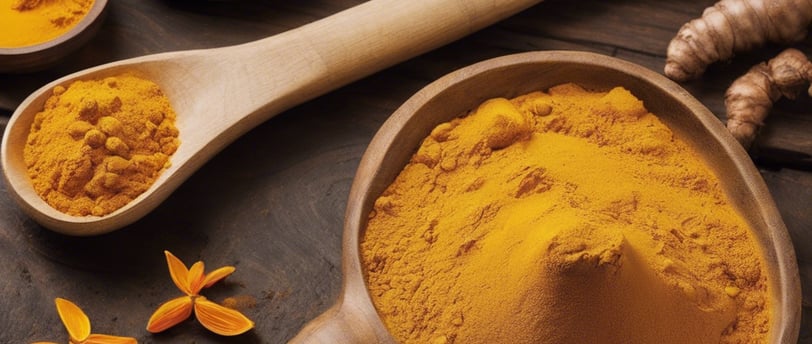The Benefits of Turmeric for Skin Brightening and Anti-Inflammation
Turmeric, a golden spice celebrated in traditional medicine, has gained immense popularity in skincare for its skin-brightening and anti-inflammatory properties. Extracted from the roots of the Curcuma longa plant, turmeric is packed with potent compounds like curcumin, antioxidants, and essential nutrients. These properties make it a powerful addition to any skincare routine. Below, we delve deeply into the transformative benefits of turmeric for the skin and how it addresses common concerns.
Ifsha Mudasir
11/19/20243 min read


Turmeric: A Natural Solution for Skin Brightening
The quest for radiant, glowing skin often leads to the discovery of natural remedies, and turmeric stands out as a top contender. Its skin-brightening benefits are backed by both ancient traditions and modern science.
1. Reduces Dark Spots and Hyperpigmentation
Hyperpigmentation, caused by excess melanin production, leads to dark patches that can dull the complexion. Turmeric’s active ingredient, curcumin, helps regulate melanin synthesis, effectively fading dark spots and uneven skin tone over time. Regular use of turmeric in skincare products or DIY masks can restore a more even complexion.
2. Boosts Natural Glow
Turmeric’s antioxidants combat free radicals, which contribute to a lackluster appearance. These antioxidants rejuvenate the skin, promoting a youthful glow. For centuries, brides in South Asia have used turmeric masks before weddings to achieve radiant, luminous skin.
3. Gently Exfoliates
When combined with natural exfoliants like chickpea flour or oatmeal, turmeric acts as a mild yet effective exfoliator. It removes dead skin cells, revealing the fresher, brighter layers beneath.
Anti-Inflammatory Properties: Healing and Calming the Skin
Skin inflammation manifests as redness, irritation, or conditions like acne and eczema. Turmeric’s anti-inflammatory benefits target these issues at their core, promoting healthier skin.
1. Soothes Acne-Prone Skin
Inflammatory acne can be stubborn and painful. Curcumin reduces redness and swelling associated with acne, while its antimicrobial properties fight Propionibacterium acnes, the bacteria responsible for breakouts. Incorporating turmeric into a skincare routine can result in fewer flare-ups and faster healing of active pimples.
2. Calms Skin Conditions
Eczema, psoriasis, and rosacea cause discomfort due to chronic inflammation. Turmeric's ability to inhibit inflammatory pathways makes it an effective natural remedy for these conditions. Applying turmeric-infused creams or oils can alleviate itching, redness, and irritation.
3. Speeds Up Wound Healing
The antimicrobial and anti-inflammatory effects of turmeric accelerate the body’s natural healing process. This is particularly beneficial for minor cuts, scrapes, or acne scars. Turmeric reduces the risk of infection while promoting tissue repair.
How to Incorporate Turmeric into Your Skincare Routine
Integrating turmeric into your daily regimen is easier than ever, thanks to its versatility. From DIY recipes to professionally formulated products, the options are vast.
1. DIY Turmeric Masks
A simple turmeric mask can be made at home using pantry staples. Mix one teaspoon of turmeric powder with two tablespoons of yogurt and a teaspoon of honey. Apply this mixture to your face, let it sit for 15 minutes, and rinse off with warm water. This mask brightens skin and deeply hydrates.
2. Turmeric Serums and Creams
Modern skincare brands have harnessed turmeric’s benefits in the form of serums, creams, and oils. Look for products with a stable form of curcumin to ensure maximum efficacy.
3. Dietary Inclusion
Turmeric’s benefits extend beyond topical application. Consuming turmeric in your diet—whether as a spice or a supplement—nourishes your skin from within, reducing systemic inflammation and enhancing overall skin health.
The Science Behind Turmeric’s Effectiveness
The effectiveness of turmeric lies in curcumin, its bioactive compound. Curcumin exhibits strong anti-inflammatory, antioxidant, and antimicrobial properties, supported by numerous clinical studies. These attributes make turmeric a multi-functional ingredient capable of addressing various skin concerns simultaneously.
Antioxidant Powerhouse
Curcumin neutralizes free radicals that cause oxidative stress, one of the leading causes of premature aging. By protecting skin cells from damage, turmeric ensures a healthier and more resilient complexion.
Inhibits Pro-Inflammatory Enzymes
Inflammatory enzymes like COX-2 exacerbate skin issues, but curcumin naturally suppresses their activity. This reduces redness, swelling, and discomfort in affected areas.
Precautions When Using Turmeric
While turmeric is generally safe, its potent nature requires mindful use to avoid adverse effects.
1. Patch Test First
Turmeric may cause temporary staining or irritation for some individuals. Always perform a patch test before applying turmeric-based products to your face.
2. Use the Right Concentration
High concentrations of turmeric can overwhelm sensitive skin. Opt for products with a balanced formulation to minimize the risk of irritation.
3. Protect Against Staining
DIY masks made with turmeric can temporarily stain the skin yellow. Mixing turmeric with oil or milk can mitigate this effect.
Turmeric: A Timeless Skincare Ally
The benefits of turmeric for skin brightening and anti-inflammation are undeniable. From reducing dark spots to calming irritated skin, this golden ingredient offers a natural, effective solution for a range of skincare concerns. Whether applied topically or consumed as part of a balanced diet, turmeric enhances skin health holistically.
By incorporating turmeric into our skincare routines, we embrace a time-tested remedy supported by science and tradition. Its versatility and efficacy make it a must-have for achieving a radiant, blemish-free complexion.
